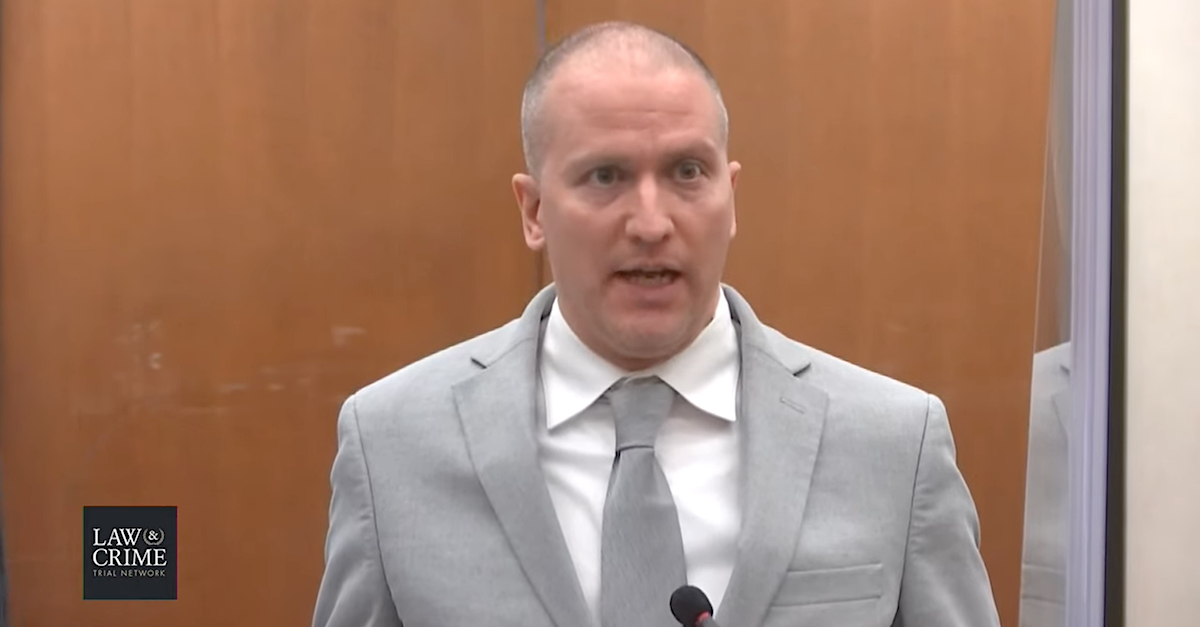
Derek Chauvin at his sentencing hearing.
A group of media organizations, including The Associated Press, CBS, CNN, The New York Times, NBC, and more, are asking a Minnesota judge to unseal the identities of jurors who convicted fired police officer Derek Chauvin, 45, of murdering George Floyd, 46. The media coalition reasons that enough time has passed and safety is no longer a big enough concern to justify withholding names.
“The Media Coalition does not mean to make light of the unrest George Floyd’s murder caused or the fears about what might have happened in April if the public had disagreed with the jury’s verdict,” the group wrote in a filing dated Wednesday. “But much has changed in the months since the jury rendered that verdict, and at this juncture, resistance to releasing their names appears based on little more than a desire to have them left alone. That’s not enough.”
The coalition even quoted late Supreme Court Justice Antonin Scalia in the memorandum.
From the memorandum in support of their motion [emphasis theirs]:
As explained in greater detail below, identification of jurors is a central feature of our criminal justice system, not a flaw or an afterthought, and the common refrain among laypersons that “they did their duty, now leave them alone” ignores the full scope of a juror’s responsibility. Simply put, our criminal justice system asks jurors not only to leave their jobs and families, evaluate often-heartbreaking evidence, and make difficult, life-altering decisions but also to do so publicly, by name, and to then find the personal fortitude to withstand the scrutiny that results as the public tries to understand and learn from the verdict. As Justice Scalia wrote in concurring that the names on a petition must be disclosed to the public despite fears of “threats and intimidation”:
There are laws against threats and intimidation; and harsh criticism, short of unlawful action, is a price our people have traditionally been willing to pay for self-governance. Requiring people to stand up in public for their political acts fosters civic courage, without which democracy is doomed.
As seen on video watched around the world, Chauvin kneeled on Floyd’s neck for several minutes during an arrest for using a $20 counterfeit bill. The 46-year-old Floyd became increasingly unresponsive and died, sparking widespread unrest and racial justice protests against police brutality.
Chauvin’s defense argued that Floyd died from pre-existing health and drug issues, but the jury agreed with the state that Floyd would not have died were it not for the manner in which he was restrained. As a result, Chauvin was convicted of murder and sentenced to 22-and-a-half years in prison. Two days after the guilty verdict, Judge Peter Cahill ruled that juror identities must remain sealed considering all the attention the case has received.
“The lawyers have reported receiving unprecedented levels of emails regarding this case, frequently of incendiary, inflammatory, and threatening nature,” he wrote. “The Court itself has received unprecedented levels of emails and telephones calls about the case. Articles have been published locally and nationally containing many details, albeit not names or addresses, about the jurors gleaned during voir dire. The Court has informed the sworn jurors and alternates that they may, if they choose, identify themselves publicly and speak with whomever they wish about this case.”
Cahill ruled that it remained “necessary to protect those jurors desiring to remain anonymous from unwanted publicity or harassment.”
The media coalition does not see it that way, saying public response to the verdict was quite positive, and noting that two jurors and an alternate stepped have forward to speak on the record.
“Meanwhile, prior to sentencing, two jurors and one alternate voluntarily came forward and spoke publicly about their experience—Lisa Christensen, the alternate, within the first couple of days after the verdict; Brandon Mitchell a week or so later; and Journee Howard in early June,” they wrote. “Undoubtedly, they fielded many inquiries in the hours and days after coming forward, but the Media Coalition is not aware that any of them has been threatened, harassed, or otherwise made to fear for their safety since coming forward.”
They also mentioned the upcoming trial of Tou Thao, J. Alexander Kueng, Thomas Lane, the three former officers accused of aiding and abetting Floyd’s killing.
“The reasons for contemporaneous access to the Juror Materials are obvious here: there are other prosecutions against police officers already scheduled for trial in this very Court— Kimberly Potter in December and Mr. Chauvin’s co-defendants in March—and Mr. Chauvin and his co-defendants are set to be arraigned on federal charges in September. And whether they involve police officers or not, future prosecutions that divide the public are inevitable. Thus, the time to build confidence in the judicial system—the time to learn from the Chauvin jurors—is now,” the filing argued.
[Screengrab via Law&Crime Network]